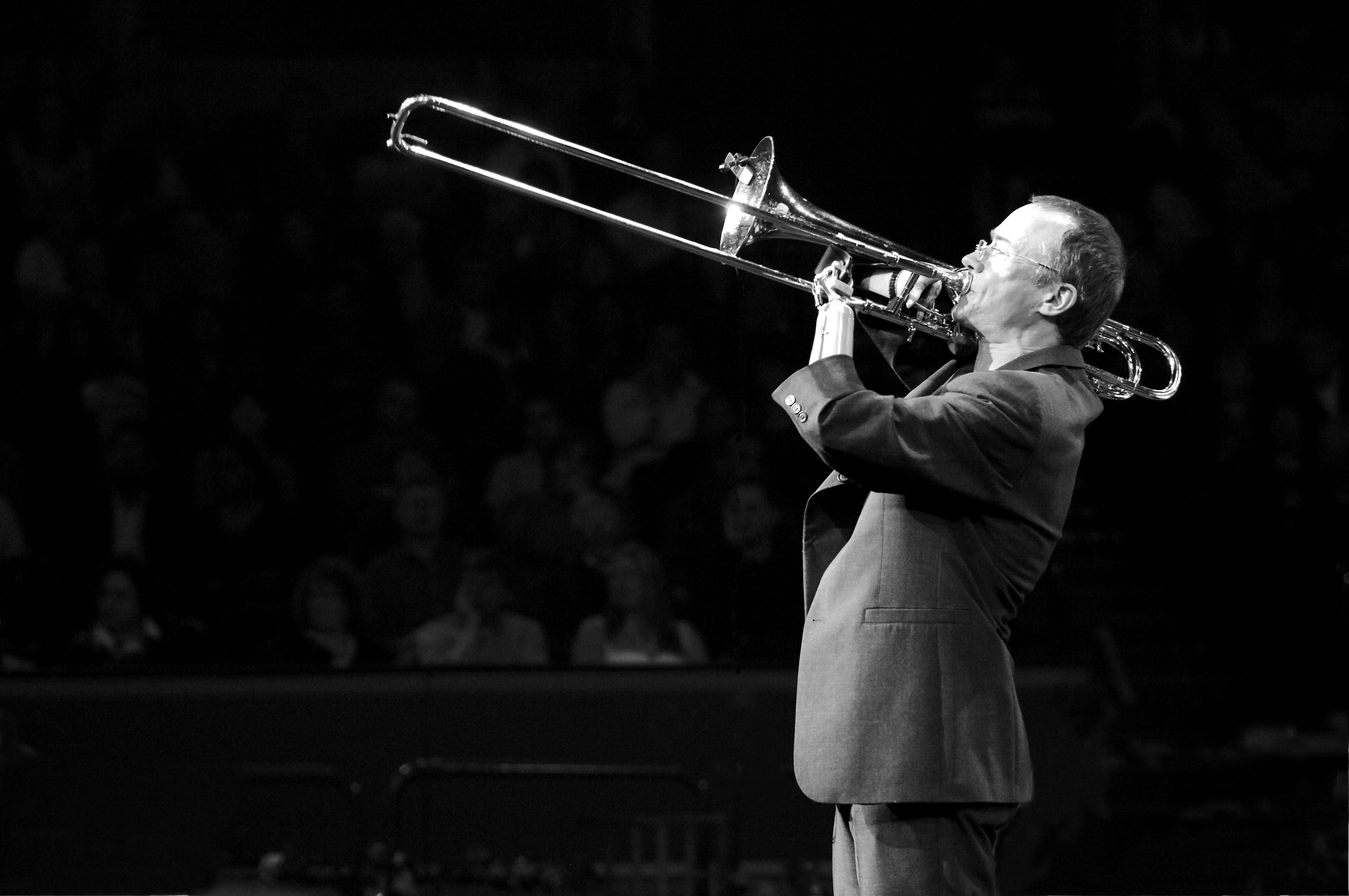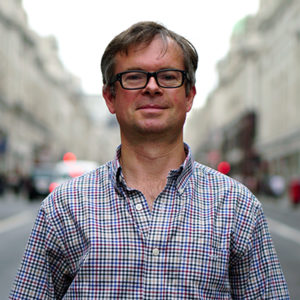Mark Bassey Interview

Trombonist Mark Bassey moved from London to Brighton a few years ago and talks to Charlie Anderson about the change.
How did you start out playing music?
“I was born with no hands and I have an artificial hook on the left side and an artificial finger on the right side. When I was 11, at secondary school, the instrument I started on was actually the drums. I learnt the drums for three weeks. The drum teacher was Brian Booth, a very inspired man, and he said “I could teach you the rudiments of playing the drums, but because of your artificial hook, you’ll find it hard to master some of the more intricate techniques’. (press rolls etc.). He said ‘What about the trombone?’ and I remember thinking at the time, ‘I could give that a go’. I did have a recollection that my mum and dad had an elderly friend who had lost both his arms in the war and had two hooks, and he played the trombone in the Salvation Army. So I knew it was possible to play a trombone with a hook. So the following week I went to the brass teacher. The school I went to were absolutely brilliant. The metalwork teacher created a g-clamp with a rod and a g-clamp clamped on to the chair. I didn’t have to take the weight of the trombone. And they also built an extension rod so that I could reach the lowest notes. And the woodwork dept. created an amazing carved wooden handle that fitted the shape of my metal hook, so I could grab onto it. Looking back on it, what a fantastic break. Some really, really great people out there for me. I’m enormously grateful. I suspect that, at the age of eleven, I didn’t really think about it much but, looking back, what a great break.”
What happened after that?
“I moved to London to do my Linguistics degree at UCL in 1979 and I hooked up with various rehearsal bands. I played with NYJO for a little while. Moving to London gave me an opportunity to join lots of rehearsal bands. So my way into jazz music was not from playing in small bands but playing in big bands. I guess that’s a feature of being a trombone player. Big bands are always looking for trombonists as saxophone players are more abundant. I had a day job for a year working as a finance clerk for the BBC. Then I did the classic thing, I gave up my day job because I wanted to be a trombone player. I went home and sat by the telephone and waited for it to ring.”
“I actually managed to wangle a study year at Trinity College of Music, I didn’t do a degree programme, just one year, which from the point of view of networking, was fantastic. I got to meet four years worth of students. That really got me going into the music business as a profession and I met lots of
interesting people and I started doing shows, gigs, function bands, that sort of thing. As far as the jazz field goes, for a long while I didn’t do many small band things, mostly big band things, quite a lot of playing peoples’ own projects. I kind of hankered after just playing some standards and things.”
How did you find moving to Brighton?
“What was interesting to me, moving from North London (I lived there for 15 years or so) was when I moved down to Brighton I didn’t know so many people. I hooked up with Terry Seabrook pretty early on, he invited me to come and sit in with his band, with Spike Wells on drums, Paul Whitton on bass and Simon Savage playing tenor. Terry put a few gigs my way. I started doing some more small band things with him. Also, Nigel Thomas, Dave Trigwell and Simon Robinson had a little thing going over in Lewes.”
“The thing, I think, that was different for me, was when I was in London I was doing a lot of playing original music, people’s own projects. Roland Perrin, Mike Westbrook, John Dankworth. Wonderful bands. A real privilege to have the opportunity to play with people like that but I kind of missed just sitting in a pub playing some tunes. I did start my own band, Bassey Plays Basie with Terry Seabrook and Simon Savage and bassist Dave Whitford and drummer Ron Parry. Those were some people that were important to me at that time, and still are.”
How do you think the jazz scene is different, in terms of gigs and jam sessions?
“I’ve never been a great fan of going to jam sessions, I did in the dim and distant past. There’s a place for jam sessions, it’s a great networking thing, it’s a social thing and musically, I guess it’s nicer to do an actual gig and play all evening.”
“The separation of the different genres of music, which happens everywhere, and
certainly in London, it’s quite compartmentalised. There’s a bebop, trad, African, Latin scene. There’s not a huge amount of overlap. I’d like to say it’s less the case in the Sussex area, but I think it probably is a little bit compartmentalised as well here. I’ve always ducked and dived a lot. It’s one of the ways that I’ve managed to keep going, by doing as wide a range of things as I can. And I enjoy doing it. I wouldn’t say I’m a genius at any of them but I enjoy dipping into lots of different fields. I play most styles, bop things, I’m happy to do a trad gig, dixieland things. I’ve done lots of playing on the Latin scene. In the Brighton area I’ve played with Bacalao salsa band. The scene is still a bit separated in Brighton, which is a shame, I think it would be nice for there to be more integration.”
“Charlotte Glasson is a perfect example of someone who embraces different styles. I’ve done a lot of work in her band. She works hard at promoting herself and promoting jazz. She’s a good illustration of someone who crosses genres. Her band does some bluesy things, New Orleansy things, swing things, original things, some of my tunes. And through Charlotte I’ve been working with bassist Herbie Flowers and guitarist Chris Spedding. Now, Herbie Flowers. His show. He plays a huge variety of things. He does some jazz, pop, old swing tunes. From an audience point of view, it’s pretty broad-ranging. I’ve done a few gigs with him at the Corn Exchange and he packs it out. Where do they all come from? It’s not the regular jazz crowd.”
You do quite a wide variety of things yourself. What have you enjoyed most?
“I’ve enjoyed playing with Imogen Ryall and Rod Hart, over in Rottingdean, playing standards. I do love playing just small-band standards. I love sitting in a pub just playing some standards. I like doing other things as well. I’ve been working in Alex Eberhard’s latest project, All Things Must Pass, a celebration of the music of George Harrison. It’s a nine or ten piece band. Alex plays guitar and sings in that. It’s a mixture of jazzers and others.”
“In the past couple of years, I’ve been working with a woman based in Cambridge called Daphna Sadeh. Daphna’s band uses a lot of Middle Eastern traditions. She’s from Israel and her music has klezmer and East-European influences.”
“I also play in Skatoons, a Lewes-based ska band. Once a year they put on a big band version of their small ska band, Ska Kestra.”
“I’ve also really enjoyed doing guest spots with the Paul Busby Big Band and Straight No Chaser, The Lost & Found Orchestra, Harvey’s Brass and the The Sussex Trombone Project.”
You also do quite a bit of teaching as well.
“I’d always taught a bit privately and I kept up my contacts in London, teaching at London music colleges such as Royal Academy, Trinity and Guildhall and some of my students from London still came down to Brighton for lessons.”
“Over the years I’ve done a few workshops for the Brighton Jazz Co-op. The Ropetackle course [in Shoreham] is a really nice development. I’ve enjoyed doing that very much and as the Musical Director of the Sussex Jazz Orchestra, I feel very
chuffed to be doing that as well. The work that I do is a balance of performing and teaching. It’s probably about 60% teaching-based, at the moment, and 40% performance-based.”
“Some jazz musicians do a bit of teaching to bump up their income, which is fine, but I genuinely enjoy my teaching and I feel fortunate to have some really nice opportunities to work with students who are both interested and interesting, that doesn’t always happen. I’m very fortunate in that sense.”
The trombone as an instrument. Not everybody likes it.
“I used to love listening to the trombone. As a teenager, when all my friends were listening to Led Zeppelin, Genesis and Pink Floyd, I was listening to Acker Bilk and his Jazz Men, Kenny Ball. I used to love all that trad and dixieland because the trombone got used a lot. I also used to listen to a lot of big band music, including the BBC Radio Big Band. There were always trombone solos coming up so that was always an inspiration for me.”
“Even today, I can get on a train with my case over my shoulder, and people say ‘What’s that? Is that a saxophone?’ And I say ‘No, it’s a trombone’ and the number of people who go ‘Oh. I don’t like trombone much’ and that’s the end of the conversation. That always cracks me up. It’s very honest. Fair enough.”
“I guess part of that is because The trombone is used in a very wide range of genres. A person who likes really gut-bucket dixieland trombone might never have heard a really smooth, sultry Tommy Dorsey solo. And then probably different again from someone who listens to Bob Brookmeyer who plays valve trombone. A very different style of playing. And contemporary jazz players, like Mark Nightingale, have a very sophisticated, beautiful smooth sound. The trombone does get used in a lot of different styles and I think people who have heard one style, generalise. It’s amazing the number of people that think the trombone is a loud instrument. Often, at private parties, people are always cautious about having a trombone. It doesn’t have to be played as a raucous instrument, it can be played quite smoothly, dare I say it, like a saxophone.”
Find Out More
Interview with Mark Bassey by SJM editor Charlie Anderson, conducted at Ropetackle Arts Centre, Shoreham.
Photo of Mark Bassey by Ryan Marshall.



